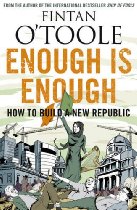 More as a trailer than a review – as it’s out on Thursday– I draw attention to Fintan O’Toole’s latest polemic “Enough is Enough – how to build a new Republic“. Fintan has been promoting the book vigorously on this side of the water, on Radio 4’s Start the Week and here at greater length in an interview on Radio 3’s Night Waves (first interview)). A pity he didn’t link both parts of Ireland in his modernisation project. Note his championship of publicly controlled education for the Republic.
More as a trailer than a review – as it’s out on Thursday– I draw attention to Fintan O’Toole’s latest polemic “Enough is Enough – how to build a new Republic“. Fintan has been promoting the book vigorously on this side of the water, on Radio 4’s Start the Week and here at greater length in an interview on Radio 3’s Night Waves (first interview)). A pity he didn’t link both parts of Ireland in his modernisation project. Note his championship of publicly controlled education for the Republic.
Extracts from Night Waves interview
How did we screw it up? There was a sense of wealth being a value in itself and that contributed to the catastrophe.. A new Republic. Let’s try to imagine a political project for the future. The historical project of creating the republic is incomplete. There’s an awful lot of rhetoric and it goes back to 1916 and of course a lot of vile stuff has been done in its name but still it has a kind of meaning. I thought it useful to ask what the (new) republic would be like and if we can really do it in five years.
First, we have a myth we have a parliamentary democracy. Ours is the weakest in Europe. You can change the way politics works. Second, you can fix the (two tier) health system.
Why has public morality failed? It failed because to a large extent we outsourced it to the Catholic church with a very narrow sense of morality based on sex. There has been little idea of civic morality. This isn’t abstract. The church system of primary education that could easily (become) a democratic publicly run system of public education. It matters to create a set of public institutions the public have daily contact with and they have control over.
(Having been attracted to the late historian Tony Judt’s idea of “ethical austerity”)…. if you have to put up with straightened times you can focus on what was important and deliver the basic necessities of life. This is a moral idea.
(If there is no movement to attach these ideas to – without which they’ll fail?)
This is Ireland’s great unfinished story, a nation that was invented in the early C20 and then destroyed – by history, by partition (yes he said that but didn’t develop it,) by the highjacking of high ideals by terrorism in a conspiratorial elite. I think it is potentially potent to say to people in this crisis – we can finish this story. What I’m depending on is the profound sense of anger, shock and dislocation. There is a sense of a revolutionary moment in Ireland. Our political culture has failed so abysmally that some kind of fundamental change has to happen.”
Is Fintan O’Toole right or overwrought? What will knock that change into shape? There is also a less breast beaten version of the story. Ireland had never come close to being rich and the Irish had always been agin the government of strangers. When they won self determination, grim necessity after a civil war and then a trade war forced them to make a virtue of austerity, hearking back to a mythical golden age of Irish purity (Dev’s “comely maidens”). Austerity like wealth can cut either way. Neither need produce equity and social justice. The moment they were able to, they binged. Today they have a powerful hangover but the old resilience will reassert itself.
Isn’t that what they’re telling themselves already, down south? False comforter?
Former BBC journalist and manager in Belfast, Manchester and London, Editor Spolight; Political Editor BBC NI; Current Affairs Commissioning editor BBC Radio 4; Editor Political and Parliamentary Programmes, BBC Westminster; former London Editor Belfast Telegraph. Hon Senior Research Fellow, The Constitution Unit, Univ Coll. London
Discover more from Slugger O'Toole
Subscribe to get the latest posts to your email.
